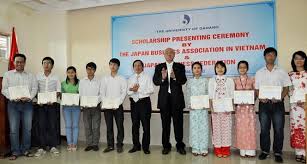Asia/Japón/Mayo 2016/Autor: Editor/ Fuente: japantoday.com
Resumen: El proyecto sigue el desarrollo de un programa de idioma japonés que introdujo el gobierno vietnamita para los estudiantes de secundaria y preparatoria en 2003. En la actualidad, Inglés y francés son los únicos idiomas extranjeros que estudiantes vietnamitas pueden aprender en las escuelas primarias.
When Pham Quang Hung started studying Japanese at Foreign Trade University in Hanoi in 1994, he never imagined that Vietnamese children would one day be able to learn the language at elementary school.
Now, Hung, a first secretary for educational affairs at the Vietnamese Embassy in Tokyo, can hardly wait to see the launch in September of a pilot project to offer Japanese lessons at three elementary schools in Hanoi.
It will be the first time that Japanese language education has been offered at the publicly run primary school level in Southeast Asia, according to Japanese officials.
The project follows the development of a Japanese language program the Vietnamese government introduced for middle and high school students in 2003. At present, English and French are the only foreign languages Vietnamese students can learn at elementary schools.
“I’m so excited about the project,” Hung, 39, said in a recent interview. “I understand Vietnam’s Ministry of Education and Training will consider expanding it at the request of other students and parents.”
The ministry will run the project in partnership with the Japanese Embassy in Hanoi and the Japan Foundation, a government-backed institution dedicated to promoting international cultural exchange.
Bilateral educational exchanges will further deepen when Vietnam-Japan University, an institution backed by the government, business and academic sectors of the two countries, opens in September in Hanoi.
With an eye toward training people for the development of Vietnam and firmer relations with Japan, the organizers aim to develop the institution, which initially will operate graduate programs in English and Japanese, into a leading university in Asia.
Japan is the biggest aid donor for Vietnam and the fourth-largest trading partner after China, the United States and South Korea. About 1,400 Japanese companies were operating in Vietnam as of last year, according to Japanese government data.
The issues of educational exchanges and human resources development may be referred to when Vietnamese Prime Minister Nguyen Xuan Phuc meets Prime Minister Shinzo Abe during his visit to Japan in late May for an outreach meeting Abe will host on the sidelines of a Group of Seven summit in Mie Prefecture, central Japan.
Along with a desire to get jobs linked to Japan, admiration for Japanese people’s diligence that made the country a major industrialized nation after its defeat in World War II and respect for their mental toughness in the recovery from the 2011 earthquake, tsunami and nuclear crisis have prompted an increasing number of Vietnamese to study Japanese, according to Hung.
“The Japanese people’s diligence has become a role model for us,” he said, speaking in fluent Japanese. “And needless to say, Japanese animation and cartoons are very popular among Vietnamese schoolchildren.”
Hung brushed up his Japanese and earned a doctorate in economics during his 2003-2009 study at Kagoshima University in southwestern Japan before teaching the language and Asian economics at his alma mater until last year.
A 2014 opinion poll on Japan in Vietnam and six other Southeast Asian countries showed that 67 percent of 293 Vietnamese people interested in learning Japanese cited a desire to visit Japan as a reason for studying the language.
The poll, conducted by research company Ipsos Hong Kong at the request of the Japanese Foreign Ministry, found in multiple answers that 62 percent said they like Japanese culture, 40 percent want to understand Japanese comics, animation and dramas, and 32 percent believe the language is useful for their jobs.
Recalling the 2003 launch of the Japanese language program for Vietnamese middle and high school students, Hung said, “We started from scratch.”
The initiative, however, has developed to the scale at which as many as about 50 middle and high schools in major cities such as Hanoi, Ho Chi Minh City and Da Nang are running Japanese classes.
“Such an expansion would not have been possible without the Japanese Embassy’s help in training Vietnamese instructors of the Japanese language, as well as supply of teaching materials by the Japan Foundation,” Hung said.
The elementary school project will similarly involve Vietnamese instructors who have experience and know-how in teaching at middle and high schools, with teaching materials to be provided by the Japan Foundation.
Including middle and high school students, there were about 46,000 people learning Japanese in Vietnam as of 2013 and more than 40,000 Vietnamese students are currently studying in Japan, according to Hung.
“The combined figure is the third highest among Japanese language learners in the 10 member states of the Association of Southeast Asian Nations after Indonesia and Thailand,” he said. “And the number of Vietnamese students studying in Japan is larger than those studying in the United States and China.”
This may reflect the fact that 46 percent of a total of 304 Vietnamese respondents to the 2014 poll cited Japan as “the most reliable country” out of 11 non-ASEAN countries in Asia, Europe and the United States. The rate, logged in a single answer, compared to 8 percent for the United States and 2 percent for China.
Fuente de la noticia: http://www.japantoday.com/category/lifestyle/view/japanese-language-learning-taking-root-in-vietnam
Fuente de la imagen: https://www.google.com/search?q=vietnam+student&client=ubuntu&hs=xVH&channel=fs&source=lnms&tbm=isch&sa=X&ved=0ahUKEwiDoIO5wsnMAhVJJh4KHYFQB4cQ_AUIBygB&biw=1301&bih=673#channel=fs&tbm=isch&q=vietnam+student+in+japan&imgrc=8kPLPwbEe5NFKM%3A














 Users Today : 3
Users Today : 3 Total Users : 35460266
Total Users : 35460266 Views Today : 4
Views Today : 4 Total views : 3418972
Total views : 3418972